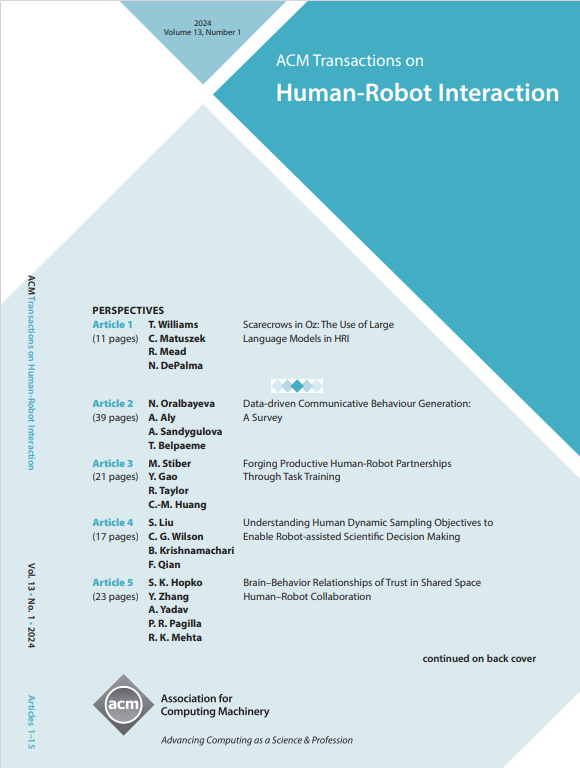Which Voice for which Robot? Designing Robot Voices that Indicate Robot Size
IF 4.2
Q2 ROBOTICS
引用次数: 0
Abstract
Many social robots will have the capacity to interact via speech in the future, and thus they will have to have a voice. However, so far it is unclear how we can create voices that fit their robotic speakers. In this paper, we explore how robot voices can be designed to fit the size of the respective robot. We therefore investigate the acoustic correlates of human voices and body size. In Study I, we analyzed 163 speech samples in connection with their speakers’ body size and body height. Our results show that specific acoustic parameters are significantly associated with body height, and to a lesser degree to body weight, but that different features are relevant for female and male voices. In Study II, we tested then for female and male voices to what extent the acoustic features identified can be used to create voices that are reliably associated with the size of robots. The results show that the acoustic features identified provide reliable clues to whether a large or a small robot is speaking.哪种声音适合哪个机器人?设计指示机器人大小的机器人声音
未来,许多社交机器人将具备通过语音进行互动的能力,因此它们必须有声音。然而,到目前为止,我们还不清楚如何创造适合机器人扬声器的声音。在本文中,我们探讨了如何设计机器人声音以适应各自机器人的大小。因此,我们研究了人类声音和体型的声学相关性。在研究一中,我们分析了163个语音样本与说话人的体型和身高的关系。我们的研究结果表明,特定的声学参数与身高显著相关,与体重的关系较小,但女性和男性的声音有不同的特征。在研究II中,我们测试了女性和男性的声音,在多大程度上识别出的声学特征可以用来创建与机器人大小可靠相关的声音。结果表明,识别出的声学特征为判断机器人说话是大还是小提供了可靠的线索。
本文章由计算机程序翻译,如有差异,请以英文原文为准。
求助全文
约1分钟内获得全文
求助全文
来源期刊

ACM Transactions on Human-Robot Interaction
Computer Science-Artificial Intelligence
CiteScore
7.70
自引率
5.90%
发文量
65
期刊介绍:
ACM Transactions on Human-Robot Interaction (THRI) is a prestigious Gold Open Access journal that aspires to lead the field of human-robot interaction as a top-tier, peer-reviewed, interdisciplinary publication. The journal prioritizes articles that significantly contribute to the current state of the art, enhance overall knowledge, have a broad appeal, and are accessible to a diverse audience. Submissions are expected to meet a high scholarly standard, and authors are encouraged to ensure their research is well-presented, advancing the understanding of human-robot interaction, adding cutting-edge or general insights to the field, or challenging current perspectives in this research domain.
THRI warmly invites well-crafted paper submissions from a variety of disciplines, encompassing robotics, computer science, engineering, design, and the behavioral and social sciences. The scholarly articles published in THRI may cover a range of topics such as the nature of human interactions with robots and robotic technologies, methods to enhance or enable novel forms of interaction, and the societal or organizational impacts of these interactions. The editorial team is also keen on receiving proposals for special issues that focus on specific technical challenges or that apply human-robot interaction research to further areas like social computing, consumer behavior, health, and education.
 求助内容:
求助内容: 应助结果提醒方式:
应助结果提醒方式:


